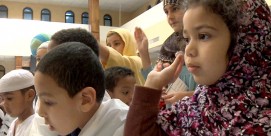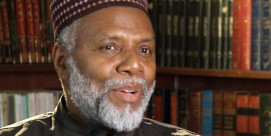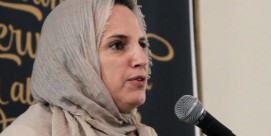In This Episode << SLIDE LEFT TO SEE ADDITIONAL SEGMENTS
Look Back 2010
BOB ABERNETHY, host: Welcome, I’m Bob Abernethy. It’s good to have you with us for this special report on the most important religion and ethics news of the year that’s almost over. Our panelists are E.J. Dionne, a senior fellow at the Brookings Institution, a columnist for the Washington Post, and a professor at Georgetown University; also Kevin Eckstrom, editor of Religion News Service, and Kim Lawton, managing editor of Religion & Ethics NewsWeekly. We begin with a video reminder of the major events of 2010 assembled by Kim.
KIM LAWTON, managing editor: It was a challenging year for interfaith relations, as American Muslims faced new tensions on several fronts. Plans for an Islamic cultural center near the site of Ground Zero generated a firestorm of debate and protest.
Protester: No mosque, not here, not now, not ever.
LAWTON: And the proposed construction of mosques in other communities generated opposition as well. A Florida pastor’s announced intention to burn the Quran on the anniversary of 9/11 set off an international furor, including violent protests in several Muslim nations. The pastor eventually backed off his plan, but controversy continued. Leaders from several faith traditions joined with Islamic leaders to denounce what they called “growing Islamophobia” across the country. Meanwhile, amid several high-profile arrests of American Muslims allegedly plotting terrorist attacks, US mainstream Islamic groups launched new campaigns to combat extremism within their communities.
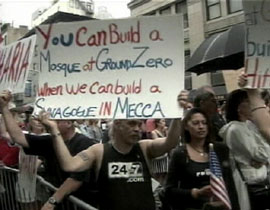 Imam speaking to Muslim students: Nonviolence, the sanctity of life is valued, and it’s not the sanctity of Muslim life, it’s the sanctity of all life.
Imam speaking to Muslim students: Nonviolence, the sanctity of life is valued, and it’s not the sanctity of Muslim life, it’s the sanctity of all life.
Despite some limited signs of economic recovery, many American families continued to face unemployment and foreclosures. Religious institutions were called upon to do more to help the needy even as they dealt with their own sustained budget cuts.
On the political front, religious conservatives appeared to be reenergized by the Tea Party movement and its campaign for limited government. Although the focus of the midterm elections was on economics, many religious right activists were hopeful a new Republican majority in the House of Representatives will provide momentum for their social agenda. On the other side of the aisle, Democrats were criticized for failing to reach out more to religious voters. Many faith-based moderates and liberals were disappointed that President Obama did not employ more religious rhetoric when he discussed issues like health care and the economy. And according to one survey, growing numbers of Americans, nearly one in five, believe incorrectly that President Obama is a Muslim.
Issues surrounding homosexuality continued to pose difficult challenges for many in the religious community. Faith groups were on both sides of the issue as Congress debated lifting don’t ask don’t tell, the 17-year-old ban on gays serving openly in the military. They also filed briefs on both sides in several court cases over gay marriage. The Episcopal Church installed its second openly gay bishop, Reverend Mary Glasspool, a lesbian.
The Roman Catholic Church confronted the ongoing clergy sex abuse crisis, this time centered in several European countries, and there were more questions about how high-ranking church officials dealt with the crisis. Pope Benedict XVI offered renewed apologies about the problem and promised new guidelines for handling allegations of abuse.
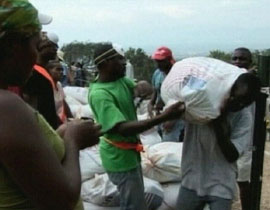 Faith-based charities scrambled to meet needs in the wake of several humanitarian disasters. Here in the US, social service groups tried to help people along the Gulf Coast after the devastating BP oil spill. In Pakistan, religious relief groups rushed to deliver aid after a summer of massive flooding that has left an estimated four million people still homeless. And for nearly a year now, faith-based groups have been actively working in Haiti, providing emergency aid and helping to rebuild after the January 12 earthquake, which killed more than 220,000 people and displaced almost two million. A rising cholera epidemic is complicating those efforts.
Faith-based charities scrambled to meet needs in the wake of several humanitarian disasters. Here in the US, social service groups tried to help people along the Gulf Coast after the devastating BP oil spill. In Pakistan, religious relief groups rushed to deliver aid after a summer of massive flooding that has left an estimated four million people still homeless. And for nearly a year now, faith-based groups have been actively working in Haiti, providing emergency aid and helping to rebuild after the January 12 earthquake, which killed more than 220,000 people and displaced almost two million. A rising cholera epidemic is complicating those efforts.
ABERNETHY: Kim, many thanks for that. To you and to Kevin Eckstrom and to E.J. Dionne, welcome. I want to get to churches and politics and economics, jobs in just a minute, but first, Kevin, what do you make of all this Islamophobia?
KEVIN ECKSTROM (Editor, Religion News Service): It’s an extraordinary place for us to be in 2010. The most extreme example you can think of on this was in Murfreesboro, Tennessee, where a zoning dispute over whether or not to build a mosque, whether they had the right to build a mosque, turned into a debate over whether Islam is actually a religion or not. And we saw it in New York in Ground Zero with the Park 51 mosque that Kim referred to in her piece. And what you saw this year was a fundamental debate over whether or not American Muslims are in a separate category or should be in a separate category from everyone else in terms of their rights, their responsibilities, and their place at the American table. And, you know, when you have a Florida pastor who can come out of nowhere and threaten to burn a pile of Qurans and get a call from the secretary of defense you know that we are not in …
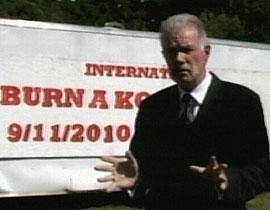 LAWTON: … asking him not to do it …
LAWTON: … asking him not to do it …
ECKSTROM: That’s right. You know that we are not in an ordinary year when it comes to American Muslims.
ABERNETHY: But meanwhile there were legitimate threats. There was a Time Square bomber and others.
LAWTON: And this put a lot of pressure on the American Muslim community, as we saw, as they were trying to portray this message that Islam is not the same as terrorism. They are not mutually the same thing. But yet there were these arrests, and so they were really having to confront their own ideology and how they get their message across, and that was a big challenge for them this past year.
E.J. DIONNE (Senior Fellow, Brookings Institution): You know, we as a country have gone through bouts of this before, and I think when we confront this now it’s worth looking back. We had a party in our country formed in the 1850s in response to the big Catholic immigration, the American Party, also known as the Know Nothings, and it took us a long time to work through anti-Catholic prejudice. It wasn’t until 1960 that John Kennedy was elected president. We had enormous fights over the Mormons and their role in our society. I think what may be most distressing about this year is that the issue of reaction to Islam has become politicized in a way that it wasn’t immediately after 9/11. You know, it’s worth remembering that right after 9/11 President Bush went out of his way to visit the Islamic center here in DC. It kind of took any political sort of edge off this. I think in this election you have more of it occurring on the right and among Republicans. It was used in the campaigns by some Republican congressional candidates, and I think you are going to need some spokespeople on the conservative side who are very much opposed to Islamophobia to speak out so we can sort of go back to the moment, oddly, that we had after 9/11 when their was a lot of opposition in the country to Islamophobia, because everybody understood our need for Muslim allies around the world.
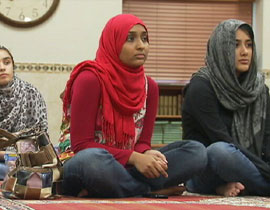 LAWTON: Well I was just going to go on top of that to say that it’s also been a challenge for leaders of other faith traditions. Muslims are looking to them, saying some of you experienced this yourselves. Where are you? Are you supporting us? Are you supporting our religious freedom? And you have seen some high-profile press conferences and statements by some of the leaders of the national religious organizations. Some Muslims wish that there were more of that going on. But I also think in some local communities, as a response to this protest in the streets, there are more interfaith dialogues going on at the local synagogue and at the local church as people try to figure out what is going on within the religious community.
LAWTON: Well I was just going to go on top of that to say that it’s also been a challenge for leaders of other faith traditions. Muslims are looking to them, saying some of you experienced this yourselves. Where are you? Are you supporting us? Are you supporting our religious freedom? And you have seen some high-profile press conferences and statements by some of the leaders of the national religious organizations. Some Muslims wish that there were more of that going on. But I also think in some local communities, as a response to this protest in the streets, there are more interfaith dialogues going on at the local synagogue and at the local church as people try to figure out what is going on within the religious community.
ABERNETHY: There’s a correlation, isn’t there, with what’s happening to jobs and the economy and the fear a lot of people have about everything. And E.J., I wanted to ask you to move from this into the election of 2010, the Tea Party, and how some of these things appeared in the election returns.
DIONNE: What was striking about the election overall is that it didn’t shift religious alignments very much. I mean the Democrats lost ground pretty well across the board, not only among more religious voters but also among more secular voters, partly because a lot of their people didn’t show up this time around. But the Tea Party is fascinating, because on the one hand the poll data makes it very clear that there is a substantial overlap between support for the Tea Party and support for the religious conservative movement. But there is also some difference between the two. The Tea Party is mildly more secular, but what I think it is even more than the Christian conservatives were is a kind of assertively nationalist movement, and that there is a feeling—I think there is a feeling in the country that we have lost ground as a nation in the world over the last 10 years. That feels part of it. There is certainly some uncertainty over the economy, and that feeds a kind of “let’s take care of our own first” feeling in the country. And so I think watching the relationship between this new Tea Party movement and the older religious conservative movement is going to be one of the most interesting stories between now and the 2012 election.
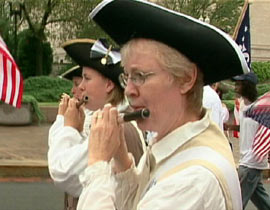 ABERNETHY: And there was this phrase that we heard often—“We want to take back the country.” How do you transpose that? How do you interpret that?
ABERNETHY: And there was this phrase that we heard often—“We want to take back the country.” How do you transpose that? How do you interpret that?
DIONNE: Many people interpret this depending on their own politics, you know. Some people look at it and say this is a reaction to immigration and it’s a reaction of traditionally white or Anglo-Saxon Americans to the growing diversity of America. I think some people might look at it in more economic terms and say, boy, did we feel more secure 30 years ago. There was less income inequality 30 years ago. Average people could count on sort of decently paying jobs no matter what their education level was. Some of it is connected to that, and I think some of it is this sense of who are in the world now compared especially to China, but to some degree compared to India, and a lot of politicians are speaking more about American exceptionalism, we are still an exceptional nation, and I think that comes from a desire to hold on to that sense and that it’s been threatened by the downturn, by a sense our power has been depleted by the two long wars we’ve been in. And so I think there is this spiritual element to what is a national discussion about our national standing.
ABERNETHY: And Kim, between the parties did we see a God gap again in this last election?
LAWTON: Well, that’s what people used to talk about, the God gap—that Democrats appeared to be less friendly towards religion than Republicans, and President Obama and his campaign in the last presidential election and the Democratic Party had really seemed to make an effort to change that and had really reached out to the religious community. I’ve been surprised at the difficulty of President Obama’s relationship with the religious community over this past year. A lot of religious moderates and liberals have been very frustrated with him and some of his policies. They’ve been disappointed he hasn’t been speaking more about religion, and a lot of their community were frustrated that the Democratic Party didn’t appear to be reaching out to them in the past midterm election, so some of that separation still seems to be there.
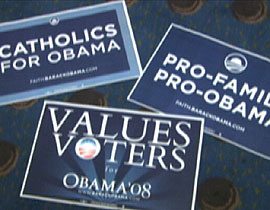 ECKSTROM: I think the most interesting God gap you saw this year was the gap between perception and reality on whether or not the president is a Muslim or not.
ECKSTROM: I think the most interesting God gap you saw this year was the gap between perception and reality on whether or not the president is a Muslim or not.
ABERNETHY: What do you make of that?
ECKSTROM: I think when people say that he is a Muslim or that they think that he’s a Muslim, they are certainly not saying it as a compliment. It’s a way of smearing someone now in America in 2010. If you don’t like them, you can say that they are a Muslim. It’s a way of saying that he’s different, that he’s other, that he’s not like the rest of us. But you know, you have a president who speaks in Christian terminology, who went to church on Easter, who talked about finding salvation at the foot of the cross and all this. And yet there’s this gap, this interminable gap that they can’t seem to quite get over. As much as he talks, as many places as he goes, people still want to think that he’s not quite like us, and the Islam label or the Muslim label is a way of expressing that.
DIONNE: And I think there’s another side to it which Kim talked about in that excellent piece—more information per second that any video this year—and that is that President Obama talked quite a lot about religion and his own faith and his own views on the relationship between religion and public life from 2006 to 2008 when he was running for president. I think he’s done a lot less of that in the White House. Now he might defend himself saying I had awfully big problems to deal with out there. Nonetheless, I think that was a missing piece in the way he talked about issues. It was a missing piece partly, I think, on the grounds of persuasion; that providing an underlying philosophical rationale for what he was doing would have helped him, I think, in these two years. But also it’s a sort of a missing piece of who he is, and I think he does need to talk more about it. And it’s not just that minority that sees him as Muslim. I think there’s a minority that dislikes President Obama that would say almost anything about him. But there’s a larger group that just doesn’t have a sense of exactly who he is in this area, and I think he addressed it really well, I think, his critics believed that, from ’06 to ’08. I think he needs to address is again.
 LAWTON: And it showed up in issues such as the health care debate or the economic issues, where a lot of times during the campaign trail he would use the phrase “we are our brothers’ keepers, we are our sisters’ keepers.” He would frame issues like health care as a moral issue and use sometimes religious language to talk about that, and he hasn’t done that as much in the Oval Office, and that has frustrated faith-based activists on the ground who believe that and who use that kind of language to mobilize their own people.
LAWTON: And it showed up in issues such as the health care debate or the economic issues, where a lot of times during the campaign trail he would use the phrase “we are our brothers’ keepers, we are our sisters’ keepers.” He would frame issues like health care as a moral issue and use sometimes religious language to talk about that, and he hasn’t done that as much in the Oval Office, and that has frustrated faith-based activists on the ground who believe that and who use that kind of language to mobilize their own people.
ABERNETHY: The recession continues and hurts everybody, and not least churches. Anybody want to talk about what the job problem has meant in churches?
LAWTON: Well, they’re having to do more to help people in their congregations. A lot of food banks and faith-based social services are saying they are seeing more and more people coming to them. People, middle-class people who’d never gone to a food bank before in their lives are now having to do that because of the ongoing economic problems, and at the same time religious institutions, like everybody else, are making budget cuts and slashing staff because of the difficulties.
ABERNETHY: Pastors, assistant pastors, associate pastors out of work.
LAWTON: A lot of congregations talk about that, really cutting back.
ECKSTROM: And what I’m hearing from clergy is that the recession that began in 2008 is actually now sort of catching up in reality with people as they are making their pledge payments for 2011 or going forward, where they are saying I’d like to pledge the same that I did last year but my husband just lost his job or we just don’t have as much money this year. So there’s going to be some difficult choices facing American congregations going forward from here about how they balance lower income from the pews with demand increase for services.
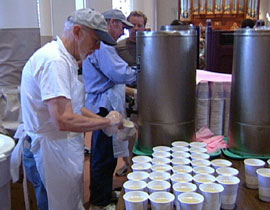 DIONNE: I was so struck in Kim’s piece that she kept coming back to what religious institutions are doing in the charitable sphere, whether it’s for the unemployed here or the suffering folks in Pakistan, and I think sort of one of the good news stories of the year was the publication of a book called “American Grace” by Bob Putnam of Harvard, David Campbell of Notre Dame, where they found that American—first of all, there is an enormous amount of charity that comes out of the religious community in America and that people connected to religious institutions seem to have more of a proclivity toward doing that, and that there is a kind of built-in religious tolerance in the country because of our religious diversity. It was actually a very optimistic book about the nature of religion in America, and I think Kim’s piece kind of underscored that.
DIONNE: I was so struck in Kim’s piece that she kept coming back to what religious institutions are doing in the charitable sphere, whether it’s for the unemployed here or the suffering folks in Pakistan, and I think sort of one of the good news stories of the year was the publication of a book called “American Grace” by Bob Putnam of Harvard, David Campbell of Notre Dame, where they found that American—first of all, there is an enormous amount of charity that comes out of the religious community in America and that people connected to religious institutions seem to have more of a proclivity toward doing that, and that there is a kind of built-in religious tolerance in the country because of our religious diversity. It was actually a very optimistic book about the nature of religion in America, and I think Kim’s piece kind of underscored that.
ABERNETHY: Kevin, social issues. Don’t ask don’t tell was repealed. Proposition 8—I don’t know where that stands; maybe you do. Talk about those a little bit.
ECKSTROM: It was a significant year for the gay movement in all of its various forms. Gay and lesbian soldiers will now be able to serve in the military openly. On the marriage front, you had a federal court strike down California’s ban on gay marriage, and I think the most significant and often overlooked part of that ruling was that the judge said that religious feelings about homosexuality, religious bias if you will, is not enough to legislate on—that whatever your religious feelings are on the issue, that that’s not enough when it comes to civil rights, and that’s a fairly significant finding, and he found it as a finding of law, a finding of fact—that it wasn’t disputable, and that’s going to be going forward. But you also see in the sort of conservative resurgence that there’s a lot of resistance to going too fast on this issue. And so you’ll see, like in New Hampshire, where the Republicans have regained control of the legislature, they might try to repeal the gay marriage law there that’s a couple years old. You saw judges in Iowa who lost their jobs because they voted in favor of gay marriage last year. So it’s—this issue is always sort of two steps forward, one step back.
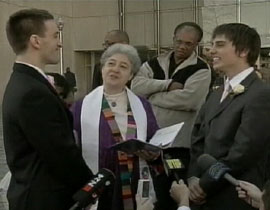 LAWTON: It’s been a difficult issue for a lot of people in the religious community whose religious beliefs teach that homosexuality is a sin, and that rubs up against civil rights and so you get to this very difficult place. So I was struck this past year by how people were examining their rhetoric, and you had the anti-gay bullying, the very tragic cases of young gay people committing suicide, and then people in the religious community looking at their rhetoric to say is it possible to oppose homosexuality without being a bully or appearing to be discriminating, and it’s a very difficult issue for a lot of people in the religious community, and how that gets worked out in society has been a challenge and will continue to be so.
LAWTON: It’s been a difficult issue for a lot of people in the religious community whose religious beliefs teach that homosexuality is a sin, and that rubs up against civil rights and so you get to this very difficult place. So I was struck this past year by how people were examining their rhetoric, and you had the anti-gay bullying, the very tragic cases of young gay people committing suicide, and then people in the religious community looking at their rhetoric to say is it possible to oppose homosexuality without being a bully or appearing to be discriminating, and it’s a very difficult issue for a lot of people in the religious community, and how that gets worked out in society has been a challenge and will continue to be so.
ABERNETHY: And E.J., we had this interesting split within the Catholic Church this past year over the health care bill and the bishops on one side and the Catholic Health Association on the other—a lot of nuns.
DIONNE: This was a huge split. I just want to go back to the gay issue for one moment. The passage of don’t ask, don’t tell—it’s hard, I think, to fully appreciate how big a move that is. Think of where we were 15 years ago, and it passed because a number of Republican senators decided that a) they were for it on principal, but b) this is now the more popular position in the country. So we still have a lot of arguments over gay marriage, but the status of gay people has changed radically in this country in a very short time. To go to your question, this was a huge fight in the Catholic Church, and it’s going to have repercussions, where you really had a dispute over what the bill actually said. You had the Catholic bishops insisting that the language in the bill could still lead to federal financing of abortion. You had the Catholic Health Care Association, which is pro-life, and quite a large group of nuns who are also pro-life, saying we looked at this language; this bill does not finance abortion. And I think this has sort of implications for which side will the Catholic Church be on in a lot of other fights. Catholic social teaching, there’s always been a kind of amalgam: very pro-life on abortion but very much in favor of social justice. In this bill those two kind of collided. The Catholic Health Association said there is no conflict here, and I think you’re going to see a lot more arguments in the church about this in the coming several years.
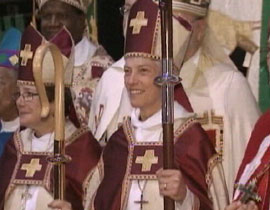 ABERNETHY: And back to what you were saying before, Kevin. There’s a difference, isn’t there, between being for don’t ask don’t tell and on the other hand having that spill over into gay marriage. There’s a lot of resistance to gay marriage.
ABERNETHY: And back to what you were saying before, Kevin. There’s a difference, isn’t there, between being for don’t ask don’t tell and on the other hand having that spill over into gay marriage. There’s a lot of resistance to gay marriage.
ECKSTROM: That’s right. There has been a 30-point shift in the last 15 or so years on the question of gays in the military. The shift on whether or not gays should be allowed to be married is somewhere more like in the five to ten range. It’s still very on the border of being a majority or minority of Americans who support it.
DIONNE: Although you still now have a substantial majority who support either gay marriage or civil unions. Civil unions in a very short time has gone from being a rather advanced or very liberal position to being a kind of middle-of-the-road position.
ABERNETHY: And Kim, quickly, are the Episcopalians still divided over gay bishops?
LAWTON: Many, many mainline Protestant denominations have been very divided over issues surrounding homosexuality/ Not just gay bishops—whether gay clergy can be in the pulpit, and gay marriage, whether their clergy can actually perform a same-sex marriage. So this has been and will continue to be a very difficult issue for many religious groups.
ABERNETHY: Our time is almost up. I wanted to ask each of you as you look back on the year whether you see something that we didn’t pay enough attention to—underreported. Who wants to begin? Kim?
LAWTON: Well, I was very struck by the Gulf oil spill and how that was an occasion for many conservative religious people to get a little more environmentally friendly. You saw Southern Baptists and others very struck by that tragedy and taking a look at some of their environmental positions.
ABERNETHY: Kevin?
ECKSTROM: I was struck by the change in rhetoric from the Mormon Church, actually, on the gay issue, where after the Prop 8 ruling came out and the gay bullying came, the church said, you know, we’ve been discriminated against in the past. We need to be much more careful about how we discriminate.
ABERNETHY: E.J.?
DIONNE: The decline of traditional culture-war politics on the one side and the rise of a different kind of cultural fight around immigration, Islam, Hispanics. I think that’s a shift we are going to be thinking about for a long time.
ABERNETHY: Many thanks to you, many thanks. Our time is up. Many thanks to E.J. Dionne of the Brookings Institution, Kevin Eckstrom of Religion News Service, and Kim Lawton of this program.



